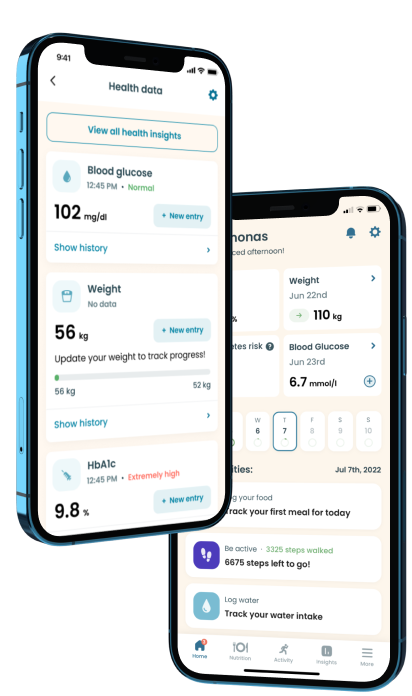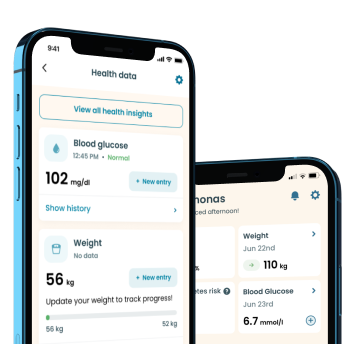Sweet Potatoes and Diabetes

Yes
70
93 kcal
It goes without saying that if you have diabetes, you need to be more careful about your diet and nutrition choices than the average person. And it’s understandable if you are also unsure about the safety of sweet potato consumption. The fact that its name bears the term ‘sweet’ is more than enough reason to be worried. On the contrary, reports claim this root vegetable is one of the safe diabetes foods to include in your diet, especially when eaten in moderation.
So, which is it? Do these starchy tuberous roots genuinely benefit people with diabetes? We’ll see that below as we review certain studies on diabetes and sweet potatoes.
Nutritional value
- Protein 2 g
- Carbohydrate 21 g
- Fat 0.1 g
- Fiber 3.3 g
- Sugar 6.5 g
- Cholesterol 0 g
Nutritional Value of Sweet Potato
Sweet potatoes are high in fiber, protein, vitamins, antioxidants, and minerals, vital for combating diabetes. According to the USDA database, one boiled medium-size sweet potato (about 5.3 oz/150 g) contains 3.78 g of fiber and 2.07 g of protein.
However, they are high in carbs at 26.7 g per serving size. This means you should eat them in relatively low amounts to prevent a sudden increase in blood sugar levels.
On the contrary, its low glycemic index (GI) of 54, its medium glycemic load (GL) of 11.3 per ½ cup, its relatively low-calorie content (115 cal per one boiled medium-sized sweet potato), and its high fiber content slow its digestion. This prevents sudden blood sugar increases when eaten.
Take a quiz
Discover what Klinio app can do for you
Healthy diabetes meal plan crafted just for YOU

Personalized workouts with no equipment needed

Track your progress with smart tracking tools

Benefits of Sweet Potatoes to a Person With Diabetes
Sweet potato, high in fiber and a variety of vitamins, offers a great way to keep your blood sugar levels in line. They can be prepared in such a way that their high carbohydrate content doesn't automatically make them unhealthy because they are high in antioxidants, vitamins (particularly vitamin C), and minerals. In the next section, we’ll see what benefits sweet potatoes have for people with diabetes.
Prevents Insulin Resistance
Sweet potatoes contain anthocyanins in addition to other minerals. Studies show that anthocyanins are a polyphenolic molecule that helps lower insulin resistance and prevents or reverses obesity and diabetes.
Regulates Blood Sugar Level
Unlike other starchy meals, sweet potatoes have a low GI of 54 and a medium GL of 11.3, which implies that sugar is released slowly into the bloodstream. This prevents the blood glucose level from going too low or too high.
Reduces Tension and Anxiety
Sweet potatoes are high in magnesium, a mineral necessary for regular bodily function. Remarkably, magnesium aids in the reduction of tension and anxiety, which is a significant issue for most persons with diabetes — diabetes patients are two to three times more likely to come down with depression.
Anti-Inflammatory Properties
Inflammation is the cause of most diabetes complications, including kidney and cardiovascular disease. Sweet potatoes are high in various vitamins, most of which are anti-inflammatory. Extracts of this root vegetable were found to potentially reduce the development of active inflammatory components in the body.
Sweet potatoes also have a high amount of choline, a vitamin with a wide range of applications. Choline has several advantages, one of which is that it decreases inflammatory responses in the body.
Vitamin A Content
Vitamin A insufficiency is a severe problem with serious health consequences, including reduced resistance to infectious disease and increased contagious morbidity. More importantly, research has linked adequate vitamin A supplementation to improved beta-cell insulin production. Since sweet potatoes contain a lot of this vitamin, they will provide similar benefits.
Aids Weight Loss
Sweet potatoes are high in soluble and fermentable fiber, promoting satiety and providing the body with a natural, self-sustaining mechanism for weight management. Pectin, one of the critical soluble dietary fibers found in sweet potatoes, has been demonstrated to reduce weight gain and increase the activation of satiety hormones in the body.
Should a Person With Diabetes Eat Sweet Potatoes?
A study found a 4% increase in the risk of type 2 diabetes among 70,773 persons who ate either mashed, boiled, or baked potatoes over four years. Hence, sweet potatoes are beneficial for diabetes but should be consumed in moderation.
How to Add Sweet Potatoes to Your Diet
How you prepare sweet potatoes impacts their nutritional value. As revealed by a study published in the Journal of Nutrition and Metabolism. Namely, specific cooking methods raise the GI of sweet potatoes. The authors discovered that baking and roasting were the worst cooking methods, followed by frying. On the other hand, boiled sweet potatoes had the lowest GI, having more potential to minimize postprandial blood sugar spikes and prevent diabetes complications.
Sweet potatoes can be a great addition to a diabetes patient's healthy meal plan when consumed in moderation and reasonable portions. Sweet potatoes also present immense benefits to people with diabetes, owing to their rich nutrient profile. However, to benefit from them maximally, you should boil them before eating and, once again, consume them in moderation.
Summary
Sweet potatoes present immense benefits to diabetes patients, owing to their rich nutrient profile. However, to benefit from them maximally, you should boil them before eating and consume them in moderation.

Download Klinio app!
Get more by downloading our free Klinio App. Analyze your health, form new habits and manage your diabetes anytime, anywhere.
OR
SCAN QR CODE



GET THE APP











